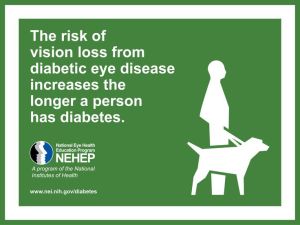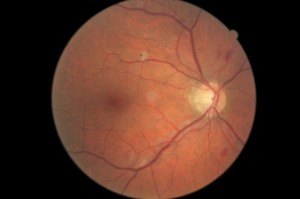Over time uncontrolled blood sugar and poor circulation can harm the internal structures of the eye.
Blurry or Double Vision
Fluctuating blood sugar and fluctuating vision are connected. A change in glucose levels affects the eye’s ability to maintain sharp focus. It may take several months after your blood sugar is well controlled for your vision to stabilize.
Diabetic Retinopathy
The leading cause of diabetes-related vision loss is diabetic retinopathy. Diabetic retinopathy can damages the network of blood vessels supplying the retina or cause the growth of abnormal blood vessels on the retina. When these fragile blood vessels leak, the fluid and blood damage the retina and can cause permanent vision loss.
Cataracts
People with diabetes have a much greater risk for developing cataracts and at an earlier age. A cataract is clouding of the eye’s natural lens and results in the inability to focus light, glare and compromised vision,
Glaucoma
Diabetes also increases your risk of developing glaucoma. Glaucoma causes irreversible damage to the retina and optic nerve. If untreated, this damage leads to vision loss.
Scheduling regular eye exams can help detect diabetes-related eye diseases before they cause irreversible damage.
Exercise, a healthy diet and keeping glucose levels and blood pressure controlled can also help control eye problems.

